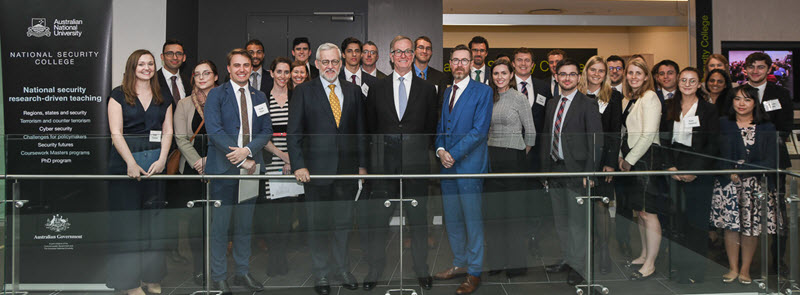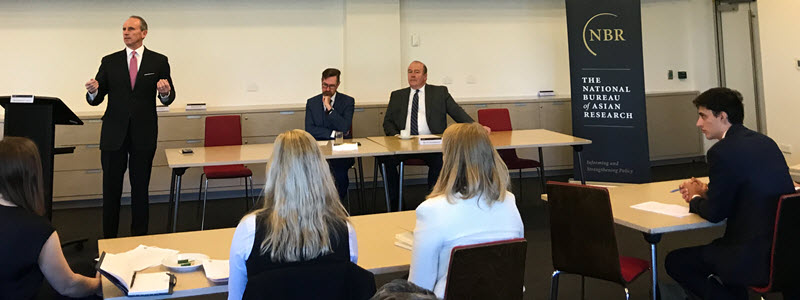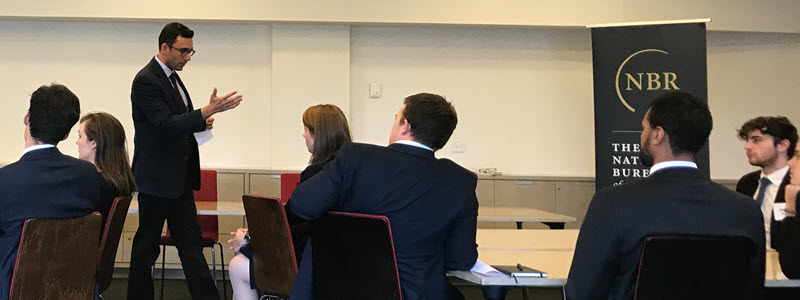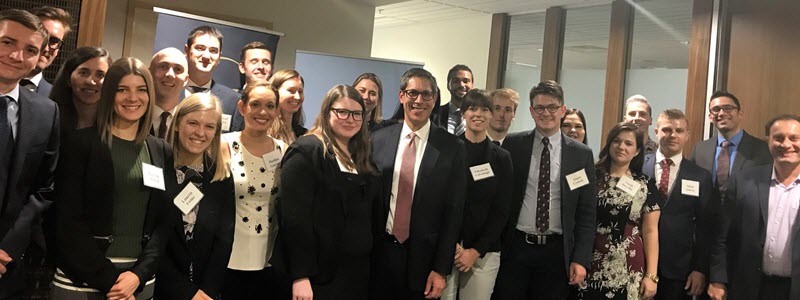Contact
Strength-to-Strength (S2S) Workshops
The Strength-to-Strength (S2S) workshops were conducted in Canberra and Adelaide to examine current and future opportunities and challenges to U.S.-Australia relations. Canberra’s program took place on April 1–2, 2019, and Adelaide’s program took place on April 4–5, 2019. The workshops in each city facilitated a trans-Pacific, cross-generational dialogue between the next generation of leaders in Australia and policy experts, government officials, and thought leaders from the United States. The first day of each workshop featured two panels and keynote speakers.
Keynote speakers consisted of senior U.S. and Australian officials: Arthur B. Culvahouse, the U.S. Ambassador to Australia; Katrina Cooper, Deputy Head of Mission to the Australian Embassy in the United States; Andrew Shearer, Deputy Director-General at the Office of National Intelligence; Consul-General Michael Kleine; and Admiral Jonathan Greenert, the John M. Shalikashvili Chair in National Security Studies at NBR.

Amb. Arther B. Culvahouse (center) with Rory Medcalf, Head of the National Security College of ANU (right), and the participants of the S2S workshop in Canberra after a discussion on the U.S.-Australia alliance.
Ambassador Culvahouse addressed the rising leaders in the room and emphasized his mission to reach out to young people in Australia. Ms. Cooper highlighted the key priorities for Australia and how cooperation within the alliance serves both the United States and Australia. Mr. Shearer focused on the challenges that the U.S.-Australia alliance faces and options for meeting those challenges. Consul-General Kleine stressed the importance of reaching out to young Australians and spoke of his “coffee diplomacy” meetings with young people to hear their views. Admiral Greenert highlighted the importance of cultivating interpersonal relations when cooperating with counterparts in other nations and within an alliance.

Adm. Jonathan W. Greenert, NBR’s John M. Shalikashvili Chair in National Security Studies, provided keynote remarks on the importance of interpersonal relations in managing the alliance at the National Security College of ANU.
The first day of S2S consisted of panels that were centered on two broad themes: security and economics. In Canberra, the opening panel was titled “Security and the U.S.-Australia Alliance,” and participants heard from ANU professors Sue Thompson and John Blaxland, Gordon Flake from the Perth USAsia Studies Center, and Arzan Tarapore from NBR. Following keynote remarks and lunch, the second panel in Canberra was titled “The U.S.-Australia Alliance and Asia Regional Architecture: Trade, Energy, and Innovation.” Expert speakers included Clara Gillispie from NBR, Bruce Luckham from the Office of National Intelligence, and ANU fellow Sarah Logan.

Dr. Arzan Tarapore, NBR non-resident fellow, discusses the outcomes of the scenario-based exercise with participants at the National Security College of ANU.
In Adelaide, the first day of S2S also focused around the two broad themes of security and economics. The opening panel, titled “Foundations of the U.S.-Australia Alliance,” featured Don DeBats of Flinders University. Mr. Flake. Dr. Tarapore, and Jesse Barker Gale from Flinders University spoke on the second panel, “The Alliance in the Region.” After lunch, the concluding panel of the day was titled “The U.S.-Australia Alliance and Asia Regional Architecture:
Trade, Energy, and Innovation.” Participants heard from Ms. Gillispie, David Morfesi from Minter Ellison, Maryanne Kelton from Flinders University, and Ian Smith from Albright Stonebridge Group.

Consul General Michael Kleine (center) poses with participants of the S2S workshop in Adelaide at Flinders University.
On the second day of the S2S workshops, participants in both Canberra and Adelaide applied the knowledge they had gained on the first day to a scenario-based exercise. Dr. Tarapore wrote and led the exercise titled “The Third Island Chain: Responding to China’s Bid for Influence in the South Pacific.” It featured a three-move game designed to test and illuminate key issues in alliance management as the United States and Australia respond to shifting regional dynamics. It demonstrated to the rising Australian leaders the complexity of cooperation within an alliance, as well as how the partnership between the United States and Australia benefits their national interests and regional peace and stability. After the conclusion of the exercise, teams had an opportunity to present their findings and discuss what they had learned over the course of the two-day workshop.
Participants said that they learned very quickly how difficult it is to balance the interests of a nation versus the interests of an alliance. Participants better understood the effort that maintaining an alliance requires and the importance of not taking the strong relationship between the United States and Australia for granted.
Partner Organizations




